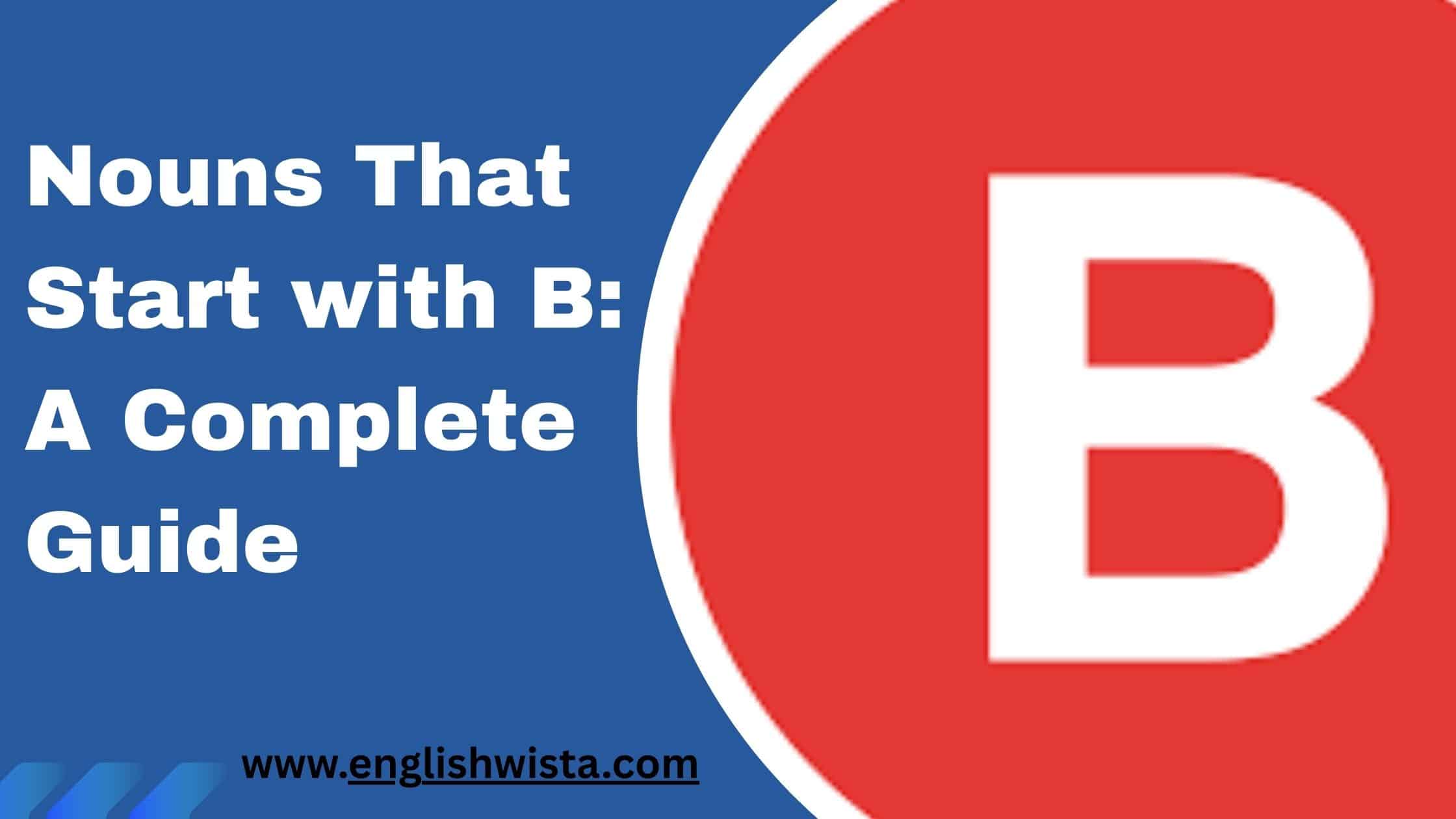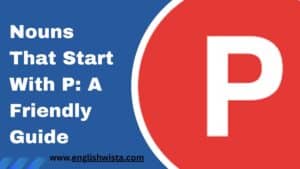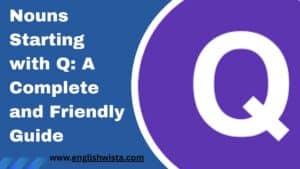Have you ever noticed how many words in English start with the letter B? From the simple “ball” to the complex “bibliography,” B-words are everywhere in our daily conversations. Whether you’re learning English as a second language or just want to expand your vocabulary, exploring nouns that start with B is a fantastic way to boost your word power.
Think about it: you probably use B-nouns dozens of times every day without even realizing it. You eat breakfast, ride the bus, read books, and sleep in your bed. That’s already four B-nouns right there!
In this guide, we’ll take a friendly journey through the wonderful world of B-nouns. We’ll explore everything from basic everyday words to more advanced vocabulary, plus some fun facts that will make you appreciate just how interesting the English language can be. Ready to dive in? Let’s get started!
What Are Nouns That Start with B?
Before we explore specific words, let’s make sure we’re on the same page about what we’re discussing.
A noun is simply a word that names a person, place, thing, or idea. When we talk about “nouns that start with B,” we mean any naming word that begins with the letter B.
These can be concrete nouns (things you can touch like “book” or “bicycle”) or abstract nouns (ideas you can’t touch like “beauty” or “bravery”). They can be common nouns (general things like “bird”) or proper nouns (specific names like “Boston”).
The letter B gives us an incredible variety of nouns. Some are short and simple, while others are long and complex. Some came from Old English, others were borrowed from different languages around the world.
Common B-Nouns You Use Every Day
Let’s start with the B-nouns you probably already know and use regularly. These are the building blocks of everyday English conversation.
Basic Household Items:
- Bed – where you sleep each night
- Book – what you read for fun or learning
- Bowl – what you eat cereal from
- Bottle – what holds your water or juice
- Box – what you store things in
Body Parts:
- Brain – the organ that helps you think
- Back – the rear part of your body
- Bone – what gives structure to your body
- Blood – the red liquid that flows through your body
Food and Drinks:
- Bread – the staple food made from flour
- Butter – the creamy spread for your toast
- Banana – the yellow fruit monkeys love
- Beef – meat that comes from cows
- Beer – an alcoholic drink made from grains
Transportation:
- Bus – the large vehicle that carries many passengers
- Boat – what floats on water
- Bicycle – the two-wheeled vehicle you pedal
- Bridge – what helps you cross over water or roads
These everyday B-nouns form the foundation of basic English communication. You’ll hear them in conversations, see them in simple texts, and use them constantly in your own speech.
B-Nouns for People and Relationships
The letter B gives us many words for describing people and the relationships between them. Let’s explore this important category.
Family and Relationships:
- Baby – a very young child
- Brother – a male sibling
- Bride – a woman getting married
- Boyfriend – a male romantic partner
- Buddy – a close friend (informal)
Professions and Roles:
- Baker – someone who makes bread and pastries
- Barber – someone who cuts hair
- Boss – the person in charge at work
- Builder – someone who constructs buildings
- Banker – someone who works with money at a bank
Character Traits (as nouns):
- Beauty – the quality of being attractive
- Bravery – the quality of being courageous
- Brilliance – exceptional intelligence or talent
- Boldness – the quality of being confident and daring
Notice how some of these words describe what people do (professions), while others describe relationships or qualities. This variety makes B-nouns particularly useful for talking about the human experience.
Places and Locations That Start with B
Geography and location words are another rich source of B-nouns. These help us describe where things happen and where we go.
Buildings and Structures:
- Bank – where people keep and borrow money
- Barn – a farm building for storing crops or housing animals
- Basement – the lowest floor of a building
- Bathroom – the room with toilet and bathing facilities
- Bedroom – the room where you sleep
Natural Places:
- Beach – the sandy area next to the ocean
- Bay – a body of water partly enclosed by land
- Brook – a small stream
- Bush – a woody plant smaller than a tree
- Boulder – a large rock
Urban Areas:
- Boulevard – a wide street, often with trees
- Block – a section of a city between streets
- Borough – a district or area within a city
- Bazaar – a marketplace, especially in Middle Eastern countries
These location B-nouns help us navigate and describe the world around us. They’re essential for giving directions, describing where we live, and talking about our travels.
Animals and Nature B-Nouns
The natural world provides us with countless B-nouns, from tiny insects to massive mammals.
Common Animals:
- Bird – flying creatures with feathers and wings
- Bear – large, powerful mammals found in forests
- Bee – insects that make honey and pollinate flowers
- Butterfly – colorful insects that undergo metamorphosis
- Bull – male cattle
Sea Creatures:
- Bass – a type of fish popular among anglers
- Barracuda – a predatory fish with sharp teeth
- Barnacle – small sea creatures that attach to ships and rocks
Plants and Trees:
- Bamboo – a fast-growing grass that looks like a tree
- Blossom – the flower of a fruit tree
- Branch – a part of a tree that grows from the trunk
- Berry – small, juicy fruits like strawberries or blueberries
Natural Phenomena:
- Breeze – a gentle wind
- Blizzard – a severe snowstorm
- Brook – a small, natural stream
These nature-related B-nouns connect us to the environment and help us describe the beautiful world around us.
Abstract B-Nouns: Ideas and Concepts
Not all nouns name things you can touch. Abstract B-nouns represent ideas, emotions, and concepts that exist in our minds and experiences.
Emotions and Feelings:
- Bliss – perfect happiness
- Boredom – the feeling of having nothing interesting to do
- Bitterness – resentment or harsh feelings
Ideas and Concepts:
- Belief – confidence in something being true
- Balance – a state of equilibrium
- Boundary – a limit or border
- Basis – the foundation or main principle
Qualities and States:
- Brightness – the quality of giving off light
- Boldness – confidence and willingness to take risks
- Brevity – the quality of being brief or short
These abstract B-nouns are crucial for expressing complex thoughts and feelings. They help us discuss philosophy, psychology, and the deeper aspects of human experience.
Plural Forms of B-Nouns
Understanding how to make B-nouns plural is important for using them correctly in sentences. Most follow standard English pluralization rules, but some have interesting exceptions.
Regular Plurals (add -s):
- Book → Books
- Ball → Balls
- Bird → Birds
- Box → Boxes (add -es after x)
Irregular Plurals:
- Basis → Bases
- Bacterium → Bacteria (scientific term)
- Buffalo → Buffalo or Buffaloes (both correct)
Nouns That Stay the Same:
- Sheep → Sheep (wait, that’s not a B-word!)
- Actually, most B-nouns follow regular rules
Special Cases:
- Baby → Babies (y becomes ies)
- Butterfly → Butterflies (y becomes ies)
- Leaf → Leaves (f becomes ves) – oops, not a B-word either!
The good news is that most B-nouns follow the standard rules you already know for making plurals in English.
Fun Facts About B-Nouns
Here are some interesting tidbits about B-nouns that might surprise you!
Etymology Excitement:
- “Butterfly” doesn’t come from “butter” + “fly.” The origin is actually uncertain, but one theory suggests it comes from the yellow color of some butterflies, resembling butter.
- “Bank” originally meant a bench or table where money changers worked in medieval markets.
- “Bizarre” comes from a Basque word meaning “beard,” because bearded Spanish soldiers seemed strange to other Europeans.
Word Length Variety:
- Shortest B-noun: “B” (the letter itself is a noun!)
- Longest common B-noun: “Bibliography” (12 letters)
- Really long B-noun: “Buckminsterfullerene” (a scientific term with 20 letters!)
Cultural Connections:
- Many B-nouns came into English from other languages: “Ballet” from French, “Banana” from Arabic, “Bamboo” from Malay.
- The word “Book” is one of the oldest B-nouns in English, dating back over 1,000 years.
Surprising Categories:
- There are more B-nouns for positive concepts than negative ones in English.
- B-nouns appear more frequently in children’s books than in adult literature, partly because many are simple, concrete words.
Using B-Nouns in Sentences
Let’s look at how these B-nouns work in real sentences. This will help you understand how to use them naturally in your own speaking and writing.
Simple Sentences:
- The bird sits on the branch.
- My brother loves to read books.
- We crossed the bridge to reach the beach.
More Complex Examples:
- The baker’s fresh bread filled the bakery with a wonderful aroma.
- Her bravery during the blizzard became the basis for a local legend.
- The butterfly landed gently on the bright yellow blossom.
Using Multiple B-Nouns:
- The businessman’s briefcase contained important blueprints for the new building.
- At the bazaar, we bought beautiful bracelets and colorful baskets.
Notice how B-nouns can work as subjects (the main focus) or objects (receiving the action) in sentences. They follow the same grammatical rules as all other nouns.
Building Your B-Noun Vocabulary
Ready to expand your collection of B-nouns? Here are some strategies for learning and remembering more words.
Start with Categories: Focus on one category at a time. This week, learn body parts. Next week, tackle buildings. This approach helps your brain organize and remember new words.
Use Visual Connections: Create mental pictures for new B-nouns. When you learn “bakery,” picture a warm shop filled with fresh bread and pastries.
Practice in Context: Don’t just memorize lists. Use new B-nouns in sentences about your own life. “I bought a new bicycle” is more memorable than just “bicycle.”
Look for Patterns: Notice that many B-nouns ending in -ness are abstract concepts (brightness, boldness). This pattern can help you understand new words.
Advanced B-Nouns to Challenge Yourself:
- Bureaucracy – a system of government with many departments
- Botany – the scientific study of plants
- Boulevard – a wide, tree-lined street
- Bibliography – a list of books and sources
- Biodiversity – the variety of life in an ecosystem
Common Mistakes with B-Nouns
Even advanced English learners sometimes make mistakes with B-nouns. Let’s address the most common ones so you can avoid them.
Spelling Challenges:
- “Beleif” → Belief (i before e, except after c doesn’t always work!)
- “Beautyful” → Beautiful (this is an adjective, not a noun)
- “Bussiness” → Business (one ‘s’ in the middle)
Countable vs. Uncountable:
- Bread is usually uncountable: “I ate some bread” (not “I ate three breads”)
- But we can say “different types of breads” when talking about varieties
Confusion with Similar Words:
- “Brake” (stopping device) vs. “Break” (to shatter or a pause)
- “Breath” (noun: the air you inhale) vs. “Breathe” (verb: the action of inhaling)
Article Usage:
- “I went to bank” → “I went to the bank” (specific bank)
- “Banks are important” → correct (banks in general)
B-Nouns in Different English Varieties
English is spoken around the world, and different regions sometimes use different B-nouns for the same things.
American vs. British English:
- American: “Bathroom” / British: “Toilet” or “Loo”
- American: “Buddy” / British: “Mate”
- American: “Biscuit” (fluffy bread) / British: “Biscuit” (cookie)
Formal vs. Informal:
- Formal: “Beverage” / Informal: “Drink”
- Formal: “Bovine” / Informal: “Cow” or “Bull”
- Formal: “Bibliography” / Informal: “Book list”
Understanding these differences will help you communicate effectively with English speakers from different backgrounds.
Conclusion
What an adventure we’ve had exploring the world of B-nouns! From basic everyday words like “ball” and “book” to more sophisticated terms like “bibliography” and “biodiversity,” we’ve discovered that the letter B gives us an incredibly rich vocabulary for describing our world.
Remember the key takeaways from our journey:
- B-nouns cover every aspect of life: people, places, things, and ideas
- Most follow standard English grammar rules for plurals and sentence structure
- They range from simple, concrete words to complex, abstract concepts
- Learning them in categories and contexts makes them easier to remember
- Both formal and informal B-nouns have their place in good English communication
The beautiful thing about B-nouns is that you’ll encounter them everywhere. Every book you read, every building you enter, every butterfly you see gives you another chance to practice and expand your vocabulary.
Start paying attention to the B-nouns around you. You’ll be amazed at how many you discover and how naturally you begin incorporating new ones into your speech and writing. Before you know it, your vocabulary will be bigger, bolder, and more brilliant than ever before!
Keep exploring, keep learning, and most importantly, keep using these wonderful words in your daily English adventures. The world of B-nouns is vast and exciting there’s always more to discover!



